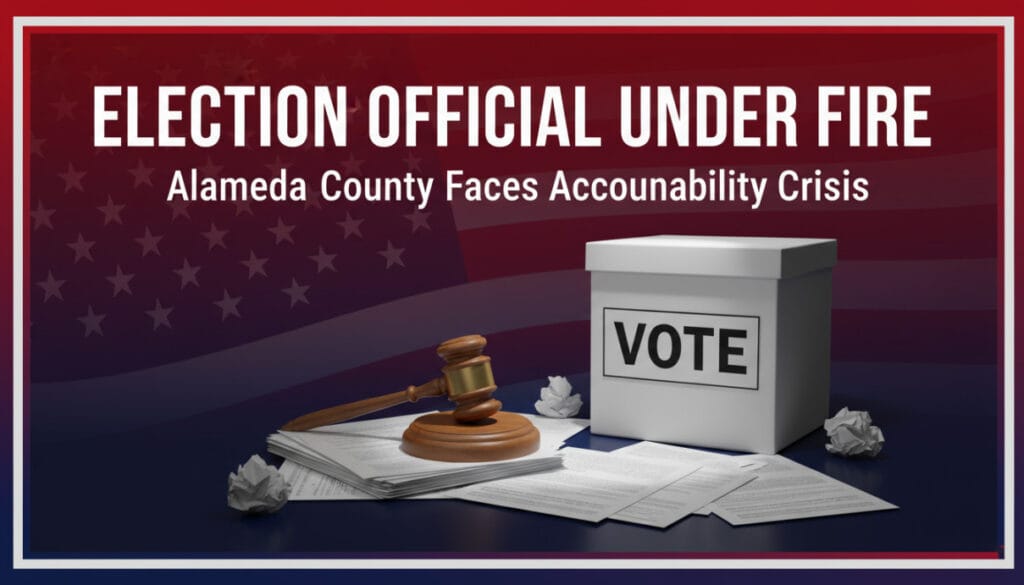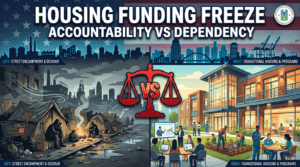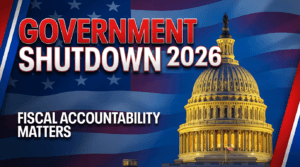Another Bay Area Election Official Under Fire: When Accountability Meets Excuses


Alameda County’s troubled election registrar faces criticism from Grand Jury, but taxpayers deserve better than defensive deflection
In yet another troubling chapter for Bay Area election integrity, Alameda County Registrar of Voters Tim Dupuis found himself on the defensive this October, pushing back against a scathing Grand Jury report that exposed serious deficiencies in his office’s handling of elections. The 2024-2025 Alameda County Grand Jury Final Report delivered 13 findings and 10 recommendations that paint a picture of an election office struggling with basic transparency, efficiency, and accountability – issues that should concern every voter who believes in the fundamental right to free and fair elections.
A Pattern of Problems
The Grand Jury’s criticism didn’t emerge in a vacuum. Dupuis, who has served as registrar since 2013, has presided over a series of election mishaps that would be embarrassing in any jurisdiction, but are particularly concerning in a county that prides itself on progressive governance. The most egregious example occurred during the 2022 Oakland school board race, where human error in the registrar’s office led to the certification of the wrong candidate as the winner in a ranked-choice voting contest.
Think about that for a moment: in America, where the peaceful transfer of power depends on accurate vote counting, an entire election was botched due to incompetence. The rightful winner, Mike Hutchinson, was eventually sworn in, but only after the error was discovered and corrected – a process that undermined public confidence in the very foundation of democratic governance.
This wasn’t an isolated incident but part of a broader pattern of dysfunction. Alameda County has earned the dubious distinction of being one of the slowest counties in California to produce election results, a fact that has generated frustration among voters and elected officials alike. Former Alameda County Supervisor Keith Carson publicly questioned Dupuis’s preparedness following the November 2024 election, noting that despite assurances about adequate workforce and resources, the reality proved otherwise.
Transparency: A Foreign Concept?
The Grand Jury report’s focus on election transparency reveals perhaps the most disturbing aspect of this saga. In a democracy, election observation is not a privilege granted by bureaucrats – it’s a fundamental right that ensures public confidence in the electoral process. Yet Grand Jury members described their attempts to observe elections as “frustrating,” with observers forced to wait two hours just to be ushered into vote tabulation rooms.
This kind of stonewalling would be unacceptable in any government office, but it’s particularly troubling when it involves the very process by which citizens choose their representatives. The Grand Jury found that the publication of election results was “incomplete, delayed and at times misleading” – hardly the hallmarks of an office committed to transparency and public accountability.
Conservative voters, in particular, have long emphasized the importance of election integrity and transparency. The ability to observe the counting process, to verify results, and to have confidence in the system is not a partisan issue – it’s a fundamental requirement of democratic governance. When election officials create barriers to observation or fail to provide timely, accurate information, they undermine the very legitimacy of the democratic process.
The Defensive Response
Rather than accepting responsibility and committing to comprehensive reform, Dupuis’s response to the Grand Jury report has been a masterclass in bureaucratic deflection. While he acknowledged implementing some recommendations for future elections, his overall stance has been defensive, describing the report as “a mix of things that we disagree with, partially agree with and do agree with.”
This kind of qualified acceptance is precisely what frustrates taxpayers who expect accountability from their public servants. When a Grand Jury – composed of citizens who volunteer their time to provide oversight – identifies serious problems, the appropriate response is not to quibble over details but to acknowledge the failures and commit to meaningful reform.
Even more concerning is the Board of Supervisors’ response to the Grand Jury’s recommendation for increased investment in the Registrar of Voters office. The board rejected the finding that more resources are needed, stating that the recommendation “will not be implemented because it is not warranted.” This response reveals a troubling disconnect between the board’s assessment and the documented problems identified by the Grand Jury.
The Broader Implications
The situation in Alameda County reflects broader concerns about election administration in California’s Bay Area. Too often, election officials in heavily Democratic jurisdictions seem to operate with a sense of impunity, secure in the knowledge that they face little political pressure from voters who prioritize partisan loyalty over administrative competence.
This dynamic is particularly problematic because election integrity should transcend partisan politics. Whether you’re a Democrat, Republican, or independent, you should be able to trust that your vote is counted accurately and that the election process is conducted with transparency and professionalism. When election officials fail to meet these basic standards, they undermine confidence in democracy itself.
The fact that Dupuis announced his resignation effective in 2026 – but only after facing sustained criticism – suggests that accountability works when citizens and oversight bodies remain vigilant. However, the damage to public confidence may already be done, and the county must work diligently to restore trust in its election processes.
Lessons for Reform
The Alameda County situation offers several important lessons for election reform advocates. First, citizen oversight through institutions like Grand Juries is essential for maintaining accountability in election administration. Without the Grand Jury’s investigation and report, many of these problems might have remained hidden from public view.
Second, transparency must be the default position for election officials, not something that requires special justification. Voters have a right to observe the counting process, to receive timely and accurate results, and to have confidence that their elections are conducted professionally.
Third, when problems are identified, the response must be swift and comprehensive. Half-measures and defensive posturing only compound the damage to public confidence.
Moving Forward
As Alameda County prepares for future elections under new leadership, the focus must be on rebuilding trust through demonstrated competence and transparency. This means investing in proper training, adequate staffing, and systems that prioritize accuracy and efficiency. It also means embracing transparency as a core value, not treating it as an inconvenient obligation.
The Grand Jury report serves as a wake-up call not just for Alameda County, but for election administrators throughout California. In an era when confidence in elections is already fragile, there is no room for the kind of incompetence and opacity that has characterized the Dupuis tenure.
Voters deserve better, and they have every right to demand it. The question now is whether Alameda County’s leaders will rise to meet that challenge or continue to prioritize political convenience over democratic accountability. The integrity of our electoral system hangs in the balance.
The author believes that election integrity and transparency are fundamental to democratic governance and that all election officials, regardless of party affiliation, must be held to the highest standards of professional competence and public accountability.











